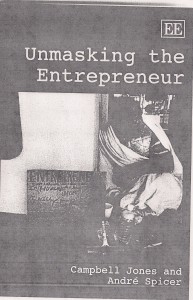Unmasking the entrepreneur
by Campbell Jones and Andre Spicer
Published by Edward Elgar

In Unmasking the entrepreneur, the reader might have been helped by a sub-title along the lines of – an exploration of the political, social and cultural context of entrepreneurship. The introductory chapters are by no means an ‘easy read’, whether this is a factor of the subject matter or the authors’ skill in dealing with the subject matter in hand – I will leave you to be the judge of this one. The photograph in the front cover to the book is however intriguing and helps to lay the foundations of the book: exactly who and what constitutes being labelled or proclaims the (pejorative or esteemed) title of entrepreneur. The photograph relates to an ‘ordinary worker’ who cleans car windows whose sign says ‘Entrepreneur…I am not a beggar…’ At least this ordinary worker could spell the term; I recall marking university exam papers where a good number of students couldn’t do so! The same students were equally dismissive of people who were termed replicative entrepreneurs (e.g. franchise operators) as they simply copied others. But isn’t copying the basis of play from which we re-create, innovate and become more entrepreneurial? But I digress.
The authors spend a lot of time rebalancing the contribution that others- the human resource of labour plays in realising the vision, dreams and aspirations of an entrepreneur. This is the nub of the book: in unmasking the entrepreneur and more explicitly the portrayal of them, the authors are making a fairly reasonable case that in the first instance too little is recorded on the actual contribution that other people make to any ‘heroic’ success (to paraphrase “ I am only here because I have managed to stand on the shoulders of others..”) and in the second case the term entrepreneur seems to allocated to anyone who has achieved a certain degree of notoriety and of course large financial profit.
If you have ever wondered where the term ‘creative destruction’ comes from, you will find a good explanation of who was responsible for the term and the contribution that this economist made to defining the physical and financial contribution that an entrepreneur brought to capitalist production modes.
There is a very interesting treatment of the case of the cockle pickers who in February 2004 suffered and died whilst going about their business on Morecambe Bay. The authors claim that the fact that they were illegal immigrants not only stripped them of their right to be labelled entrepreneurs but also a balanced account in tabloids of their life, hardships and work here in the UK.
The book concludes with some basic guidance for would be entrepreneurs: to be able to distinguish between being an entrepreneur and entrepreneurship, that entrepreneurship is concerned with building relationships with others, with valuing and recognising this contribution. In summary, this is not a book for the beach I am afraid, but one which you can quite easily ‘dip in and out of’ and come back for future reference.
Dr Chris Loughlan BSc (Glas), Cert Ed (Lough), Dip Ed (Glas), MEd (Glas), PhD (Glas).
Chris studied at Glasgow and Loughborough universities; as an ‘eternal student’ he then returned to Glasgow University until there were no more relevant degrees to offer him. He has spent most of his work time in the public sector predominantly in the NHS both north and south of the border. In 2001, he spun a small e-learning company out from Cambridge University Hospitals NHS Foundation Trust. Since then the company has grown significantly to include research and evaluation consultancy with clients at regional (e.g. Health Innovation and Education Clusters), national (e.g. The Department of Health) and international levels (e.g. WSPA and Pearson). He became a fellow of the National Council of Entrepreneurship Education in 2010, presented in the ‘Festival of Ideas’ (University of Cambridge) and has since been invited to guest lecture on creativity, innovation and enterprise at a number of higher education intuitions and policy ‘think tanks’ in the UK and abroad




